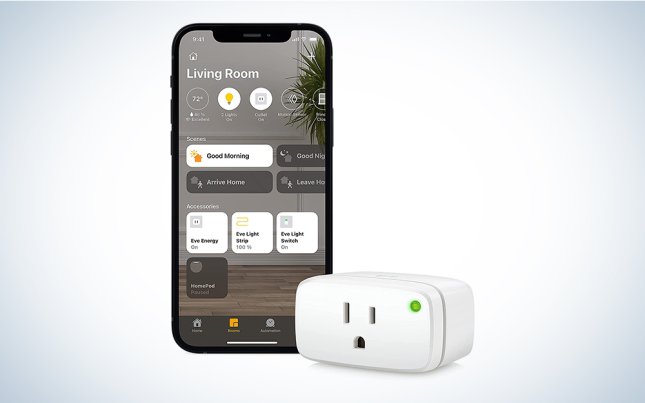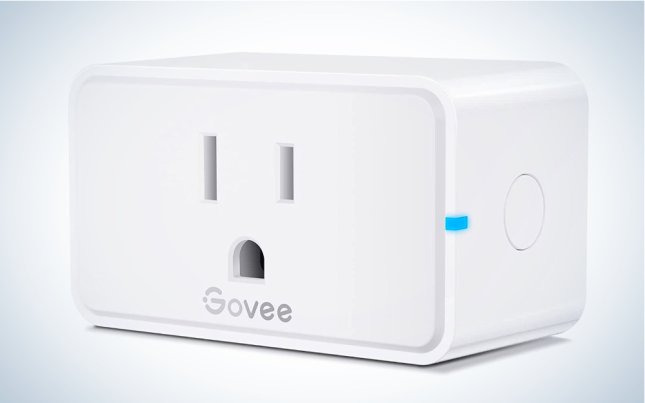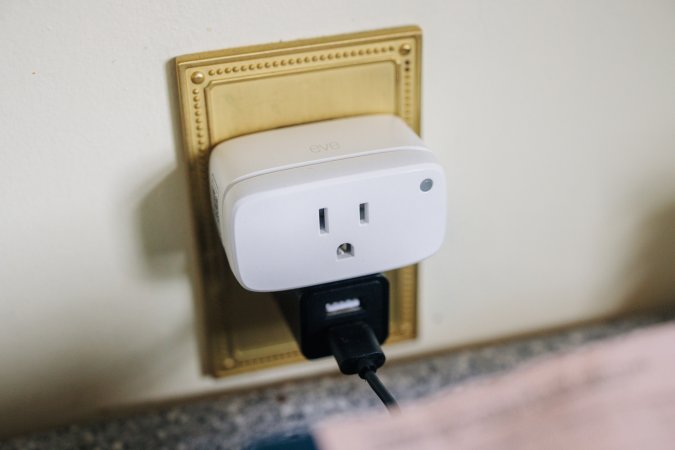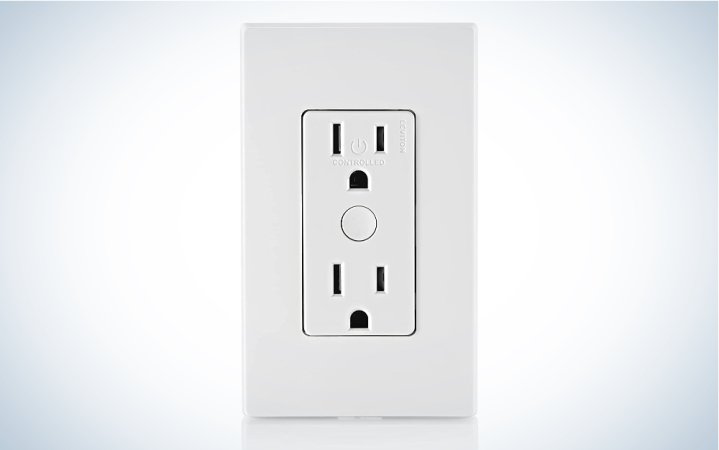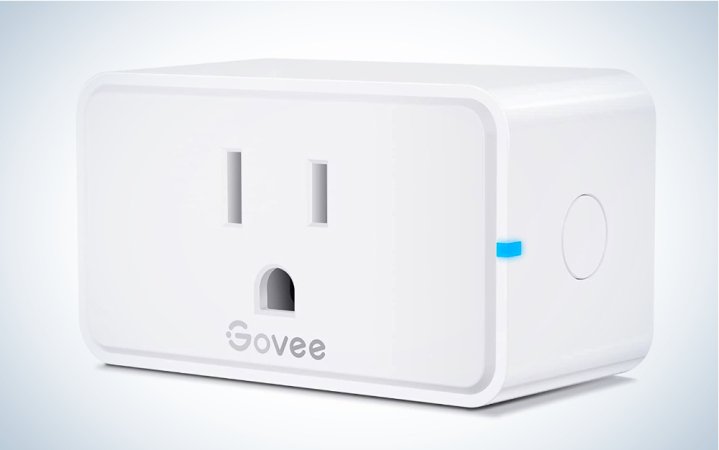We may earn revenue from the products available on this page and participate in affiliate programs. Learn more ›

Search the shelves of the local big-box electronics store, and you’ll find digital assistants built into a litany of devices—from lofty surround-sound components to the lowly plug. Microwaves now take commands from Alexa. Fridges can converse via Google Assistant. Voice commands can control just about everything in a smart home, but there are some exceptions. We chose the best smart plugs to help bring those not-connected devices into the world of the smart home.
Many crucial items in your home only understand two settings: on and off. The solution to getting older elements of your home to “wise up” is Wi-Fi-enabled smart plugs. These simple-to-use devices can turn the power to a device on and off with a simple voice request through Amazon’s Alexa, Google’s Google Home, or Apple’s HomeKit interfaces. So, whether it’s the lights on your turtle tank, the old-school coffee maker you can’t give up, or your favorite old lamp that can’t fit a smart bulb, these smart plugs can bring all of them into your voice-controlled smartphone with ease.
- Best overall: Eve Energy
- Best for Alexa or Google Nest: Wyze Plug
- Best for HomeKit: Wemo Smart Plug
- Best power strip: TP-Link Kasa Smart Wi-Fi Power Strip
- Best for outdoors: Wyze Plug Outdoor
- Best dimmable: TP-Link Kasa Smart Wi-Fi Outdoor Plug-In Dimmer
- Best in-wall: Leviton D215R-2RW
- Best budget: Govee Smart Plug
How we chose the best smart plugs
We combined our personal experiences, those of tech-savvy friends and colleagues, and testimonials from the most trustworthy sources. We have also had first-hand experience with many of the products on this list. We’ve whittled down the world of choice into a few recommendations. The key elements we considered were reliability, price, compatibility, and convenience. Size and form factor are also especially important here because fitting a smart plug into your space can be trickier than it seems.
The best smart plugs: Reviews & Recommendations
The best smart plugs have become more and more affordable. Our first recommendation is under $15 per plug. Their reliability and responsiveness have improved as well. Durability was once an issue with smart plugs, as they would wear out relatively quickly, but that, too, has become less and less of a consideration. Overall, the best smart plugs offer a simple service—Wi-Fi-enabled power control—but do so exceedingly well. The future truly is now.
Best overall: Eve Energy
Eve Energy Smart Plug
Pros
- Built-in power meter tracks usage and displays data in a handy app
- The onboard button turns off the power
- Certified to work with Matter platform
- Data collected stays local rather than going to the cloud for security
- Button can be child-proofed
Cons
- Expensive
- Functionality is limited without a hub
Why it made the cut: The first Matter-certified smart plugs, it’s extremely easy to set up, monitor, and control as long as you have an Apple Home hub, Google Home hub, or SmartThings hub.
Specs
- Electrical specs: 15 amps, 120 volts
- Size: 2.36 x 2.76 x 1.52 inches
- Smart home ecosystems: Compatible with Alexa, Google Assistant, and HomeKit
This isn’t the cheapest smart plug around, but it does offer some advanced functionality that makes it worth the extra price. This is one of the first Matter-certified smart plugs, which means it sets up very easily as long as you have an Apple Home hub (Apple TV or HomePod), a Google Home hub (Nest Hub or Nest WiFi Pro), or a SmartThings hub. I set it up in my HomeKit setup with an Apple HomePod as the hub, and it was simple to get going.
Once the Eve is part of your home network, you can turn it on and off with a tap in the app or a voice command. I have it attached to the light in our turtle tank, which requires a special fixture and heat bulb. In addition to simply turning the light on and off, the dedicated smartphone app also helps track the power usage for whatever is plugged into it. The app then relays the projected cost to let you see how much the juice will set you back when the bill comes.
The smart switch allows you to schedule the device to turn on and off from afar. That’s useful if you’re traveling. If you’re home, however, there’s a dedicated button on the smart plug that turns the power on and off manually. That’s handy when the network is down.
While there are certainly cheaper smart plugs out there, this one currently provides one of the smoothest and most robust experiences you’ll find at the moment. We’re looking forward to more smart plugs hitting the Matter platform going forward.
Best for Alexa or Google Nest: Wyze Plug
Best smart plug for Alexa or Google Nest
Smart Plugs for Wyze Shopper
Pros
- Reliable
- Reasonable price
- Good companion app
- Alexa and Google Assistant compatible
Cons
- Not HomeKit compatible
- A slight bit bulky compared to som
Why it made the cut: Wyze plugs do the job reliably on the cheap, and they get even more affordable if you buy in bulk.
Specs
- Electrical specs: 15 amps, 110 volts
- Size: 2.75 x 4.1 x 1.5 inches
- Smart home ecosystems: Compatible with Alexa and Google Assistant
Seattle-based Wyze, started by former Amazon employees, has, in two short years, become really prominent in the smart plug space by offering a good proposition: a plug that works well, works for a long time, and rarely doesn’t work for a price that’s hard to complain about. While competing plugs can run for $15-$25 per unit, Wyze undercuts all of them. The Wyze Plug is solid all-around with nearly no points for style; these plain white blocks know the assignment. Amazon Alexa and Google Nest compatibility means they’re easy to install and command, and the free Wyze app lets you set timers, group different plugs together, and create schedules. The Wyze app itself is cleaner and easier to use than some competing apps.
Best for HomeKit: Wemo Smart Plug
Best smart plug for HomeKit
Apple of your Eye
Pros
- Compatible with all three major voice-control systems
- Slim profile for more efficient use of space
- Robust features in the app
- Reliable and sturdy construction
Cons
- Slightly more expensive per unit than Wyze
- No grouping options in app
- Only comes in white
Why it made the cut: Finding affordable plugs compatible with Homekit can be a challenge, but this model fits the bill nicely.
Specs
- Electrical specs: 15 amps, 110 volts
- Size: 1.34 x 2.05 x 1.81 inches
- Smart home platforms: Compatible with Alexa, Google Assistant, and Apple HomeKit
If you’re an Apple HomeKit user, your options on the smart plug market are unfortunately limited compared to Alexa and Google. Wyze is a great basic option for most; for dedicated Apple fans, however, Wemo is the way to go. The Wemo casing is significantly smaller than the Wyze and a bit more stylish as well. The app is a little more bare-bones but still has all the functionality most users need. There’s a very solid 3-year manufacturer’s warranty, meaning you can rely on Wemo to get the job done. They set up super easily and there’s a physical button on the side in case you don’t want to use a voice command to toggle the power.
Best power strip: TP-Link Kasa Smart Wi-Fi Power Strip
Best smart power strip
Strip It Real Good

Pros
- Individual control of plugs
- Surge protection on strip
- USB slots means no need for USB power adapters to power or charge devices
- Sturdy and reliable
Cons
- Not compatible with Apple HomeKit
- More convenient six-outlet model is more expensive than two three-outlet models
- USB is always-on, not controllable
Why it made the cut: Offering two options with a ton of plugs, individual control, and surge protection all in one package, the Kasa Smart Wi-Fi Power Strip offers even more than what a single plug does.
Specs
- Electrical specs: 125 Volts
- Size: 10.24 x 2.5 x 1.52 inches
- Smart home ecosystems: Compatible with Amazon Alexa or Google Nest
A lot of us have more devices than we do plugs, so there are already probably a few power strips in your home. However, plugging a power strip into a smart plug will only give you the option of turning off the entire strip. The TP-Link Kasa Smart Wi-Fi Power Strip gives you far more control, allowing you to use the Kasa app to control each individual plug on the strip while also offering surge protection and USB power slots. The Kasa Smart Wi-Fi Power Strip is available in a 3-plug version that has 2 USB slots and a 6-plug version that includes 3 USB slots. However, in a weird quirk of pricing, two smaller Kasa strips cost significantly less than the larger one. Depending on your open plug availability or needs, you might be better off buying multiples of the small version; assess your needs accordingly.
Best outdoor: Wyze Plug Outdoor
Best outdoor smart plug
Smart in the Sunshine

Pros
- Additional power-saving and monitoring features
- Durable, weather-resistant casing
- Competitive price
- Wyze reliability
Cons
- No HomeKit compatibility
- Short cord
- Bulky
Why it made the cut: If you need power on the patio or by the pool, the Wyze Plug Outdoor has all the same benefits as the Wyze plug, plus some extra features and even stronger protection from the elements.
Specs
- Electrical specs: 15 amps, 120 volts
- Size: 3.93 x 2.68 x 1.42 inches
- Smart home ecosystems: Compatible with Alexa or Google Nest or control from Wyze app without a hub
Decks, pools, porches, and balconies can be as power-hungry as indoor areas, with lights, fans, and grills greedily gulping current. Wyze makes an outdoor-use dual-plug system that can handle anything Mother Nature throws at it while giving you not only complete control, but also a better understanding of your power usage. Unlike the typical Wyze Plug, the Wyze Outdoor Plug features options to view power usage by connected devices and also control those devices based on the power they use. Bulkier than the Wyze Plug by design, the two plugs of the Wyzer Outdoor Plug are independently controlled in the app, and have covers to protect the inside of the plug when not in use. Both Google and Amazon—unfortunately, the only two systems compatible with Wyze—offer battery-powered versions of their smart speakers that are perfect to use as outdoor hubs, as you don’t need to tether them to the wall for them to be in voice range.
Best dimmable: TP-Link Kasa Smart Wi-Fi Outdoor Plug-In Dimmer
Best dimmable smart plug
Twinkle Twinkle Little Plug
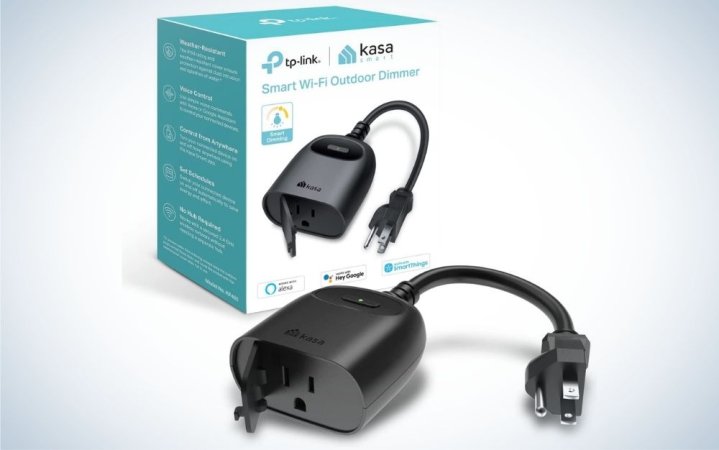
Pros
- Offers functionality traditional smart plugs do not
- Versatile
- Reliable
- Grouping and scheduling possible.
Cons
- Only offers a single plug
- Bulky due to being built for outdoor use
- Short cord
Why it made the cut: Control dimmable lights outdoors without worry.
Specs
- Electrical specs: 15 amps, 120 volts
- Size: 3.13 x 1.53 x 2.76 inches
- Smart home ecosystems: Alexa or Google Assistant compatible
Basic smart plugs typically only have two settings: on or off. But if you have a dimmable lamp or, more commonly these days, dimmable string lights for accent and mood lighting, a typical smart plug won’t do. You need a dimmable plug. Because it’s built for the outdoors, the Kasa Smart Wi-Fi Outdoor Plug-In Dimmer fits inside a burly, weather-resistant body. The black casing is good for concealing the plug outdoors, but stands out a bit indoors, so you’ll need some strategic placement or a color scheme that works with the plug. Grouping and scheduling options are available in the Kasa app. While there are indoor plugs that blend more seamlessly, the Kasa Smart Wi-Fi Outdoor Plug-In Dimmer offers versatility.
Best in-wall: Leviton D215R-2RW
Leviton D215R-2RW
Pros
- No protruding plugs
- Two smart outlets
- Works with all three major smart home platforms
Cons
- Harder to install and disconnect
Why it made the cut: It’s like having a pair of smart plugs built into your wall.
Specs
- Electrical specs: N/A
- Size: 2.75 x 4.1 x 1.5 inches
- Smart home ecosystems: Compatible with Alexa, Google Assistant, and HomeKit
If you don’t mind a little DIY project, Leviton’s D215R-2RW is the best smart plug solution out there. Instead of making a traditional smart plug, Decora created a two-outlet receptacle, which can completely replace an existing one. Installing the D215R-2RW requires you to turn off the electricity in the room it’s in, remove your current outlet, hook the new one up to your home’s wiring, and screw it back in. If you’re uncomfortable with that, you can always call an electrician to do the job for you.
The biggest benefit to choosing the D215R-2RW over a regular smart plug is that you can plug your electronic device directly into the outlet. There’s no bulbous plug protruding out of it, which can limit your access to an adjoining outlet or make it impossible to plug a bigger AC adapter into it. The space savings may seem minor, but they can make a big difference. You also don’t have to worry about “vampire power,” aka the slow drain of electricity when an electronic is plugged into an outlet but turned off. On the other hand, resetting or disconnecting the D215R-2RW is a lot more cumbersome than unplugging a dongle from an outlet.
This smart outlet is compatible with Amazon’s Alexa, Google Assistant, and Apple Homekit, which is great because it’ll probably be in your wall for many, many years. It’d be annoying to switch from one smart home platform to another only to realize you’re stuck with smart outlets that don’t work. You always have the option to control these outlets using an app on your phone, too. If you’ve been putting off getting smart plugs because of how they look or because they haven’t worked with your smart home platform of choice, Leviton’s D215R-2RW is a great option.
Best budget: Govee Smart Plug
Govee Smart Plug
Pros
- Compact size
- Compatible with multiple smart home platforms
- Price
Cons
- No Homekit support
Why it made the cut: Make your home smart for a fraction of the cost.
Specs
- Electrical specs: 15 amps, 120 volts
- Size: 2.68 x 2.28 x 1.65 inches
- Smart home ecosystems: Compatible with Alexa and Google Assistant
At just over $10, Govee’s Smart Plug is not only the best budget-priced smart plug, but it’s also one of the top values in the entire smart home device category. Govee offered this smart plug at such a low cost without making major sacrifices, which is especially impressive. It supports Amazon’s Alexa and Google Assistant but, unfortunately, not Homekit. Apple device owners can still control the smart plug using an app. You can also use the app to set devices connected to this smart plug on a timer. For example, connecting it to a lamp will allow you to turn the lights on and off at specific times, so you don’t have to open the app if you’re on a set schedule.
The value of this smart plug goes up even further if you decide to pick up more than one at a time. Govee is currently offering a $5 off coupon on Amazon, which brings the price of a four-pack down to $25. That’s just $6.25 per plug. If you’re starting your smart home, this is an unbelievable value. The lack of support for HomeKit is the only factor differentiating this smart plug from the higher-priced ones we’re recommending. If that’s not an issue for you, don’t hesitate to pick up one—or more.
What to consider when shopping for the best smart plugs
There are certainly a few considerations to make when you’re looking to smarten up your surroundings:
Socket count
Clearly, how many plugs you need and how close together they are is key. If you have many devices that need a smart plug all clumped together, a smart power strip will be a better choice. Smart power strips are more expensive than their smaller counterparts but have independently controllable plugs, making them cheaper overall than several plugs. They also almost always have USB inputs for charging devices.
Smart home platform
You’ll have to choose a smart home platform like Google Nest, Apple HomeKit, or Amazon Alexa to support the devices in your smart home—through those, you can find a way to automate everything from light bulbs to doorbell cameras to security systems, and you’ll want to make sure your plug is compatible with your chosen system. Alexa typically works best with an Amazon Echo device, of which there are many varieties. If you’re yet to invest in an Echo, Amazon often has deep discounts on the devices during their summer Amazon Prime Day sale event or during other big sales holidays like Black Friday.
Google Nest, previously known as Google Home, usually interfaces through a Google Nest smart speaker, similar to the Amazon Echo. Google has aggressively offered Google Nest speakers cheap or free as add-ons to various other Google products or through third-party retailers. Apple’s HomeKit is the newest smart home system, and, unfortunately, far fewer devices are compatible with this ecosystem.
The HomePod (2nd gen.) and HomePod mini are the Amazon Echo / Google Nest speaker competitor. Still, you can also use an iPad or newer-generation (4th) Apple TV devices as hubs for smart homes outfitted with HomeKit.
SmartThings, a Samsung-led competitor to the above, moved away from hardware in mid-2020 and is now concentrating on software while working with other companies to provide hardware. The install base for SmartThings objects is much lower than Amazon, Google, or Apple, and is a tough recommendation because it seems to be losing the market share battle.
Between the big three companies, the choice really comes down to which company you’re already using. If you’re a big iPad/iPhone user, HomeKit might be the best and easier option for interfacing with your smart plugs, even if it means fewer plugs on the market will work with your system. Echo and the Nest speaker are already in many homes; if you already have one, there’s nothing wrong with kitting out with both as your centerpiece. Even if you use an iPhone, there are compatible apps for both systems.
Indoors or outdoors?
If you have a cool outdoor lighting set-up for your deck or balcony, you must invest in outdoor-fitted plugs to avoid issues when the weather gets unpleasant. There are far fewer options to stay smart while heading outside, but the items on the market are suitably heavy-duty and weather-resistant. Indoors, you have more options, from single-plug replacements to multi-plugs to power strips, with and without USB.
Extra features
Some smart plugs go beyond simply turning devices on and off. They can create schedules or timers, for instance, to customize their functionality. Timing features can be handy when you’re away from home but want the home to seem occupied as a precaution against break-ins.
You can also create dynamic power set-ups for different situations. Pair your smart plugs with smart bulbs in different lamps and fixtures. You can create multiple colored light combinations for reading, watching TV, romantic encounters, parties, or any other situation. The smart home apps can also give you information about power usage for each device.
FAQs
Smart plugs have come a long way in a few short years, and while early versions tended to have more issues, both with power and with Wi-Fi, that has changed. The smart plugs of today are just as reliable as a regular extension cord, surge protector, or multi-plug splitter.
Absolutely. As long as your plugs are connected to your home Wi-Fi—and that Wi-Fi is on and connected to the internet—you can control your smart plugs with either the apps of the specific company that makes the plug or sometimes with a hub app for Google Nest, Amazon Alexa, or Apple HomeKit. This means you can turn the lights on if you’re going to be late, or, if you have a smart thermostat, pre-warm your house before you begin your commute home.
The difference between having a smart plug with a smart TV is whether or not you want to control power to the television itself or just the on/off settings of the TV. Smart TVs are always “on” to some degree if plugged in, so they can receive commands from your apps or hubs. By using a smart plug with a smart TV, you can turn off the TV by essentially “unplugging” the power source through the smart plug.
Smart plugs do drain some electricity when they’re plugged in, even when they’re not in use. This is true for any power adapter or other electronic device in an outlet.
If you would like to control non-smart electronics like lamps, smart plugs are a worthwhile investment.
This depends on how many you want, but a single smart plug will cost roughly $20.
Final thoughts on the best smart plugs
- Best overall: Eve Energy
- Best for Alexa or Google Nest: Wyze Plug
- Best for HomeKit: Wemo Smart Plug
- Best power strip: TP-Link Kasa Smart Wi-Fi Power Strip
- Best for outdoors: Wyze Plug Outdoor
- Best dimmable: TP-Link Kasa Smart Wi-Fi Outdoor Plug-In Dimmer
- Best in-wall: Leviton D215R-2RW
- Best budget: Govee Smart Plug
Smart plugs are a vital part of developing a larger smart home system, including appliances, thermostats, light bulbs (for color changing and self-contained dimming), and speakers. Once you acclimate to the control and convenience of a smart home, it often becomes difficult to return to “dumb” devices. Individually, smart plugs are quite reasonably priced, but once you start outfitting your entire place with intelligence power, the cost can climb quickly, which is why it’s vital to choose the best devices on the market. This guide should point you in that direction, whether you’re dipping your toe into the new present or trying to fully future-proof your surroundings.
